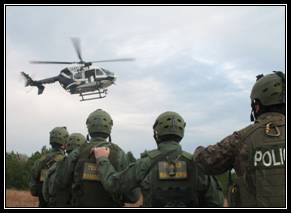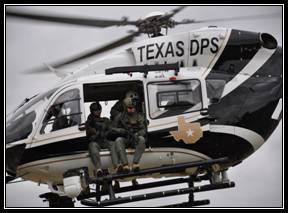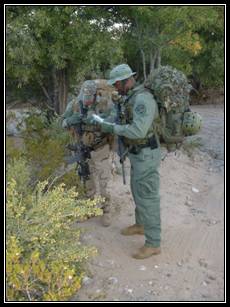Several units and teams in the Ranger Division are charged with handling a variety of specialized functions:
Special Operations Group
The Special Operations Group is comprised of six programs designed to effectively deal with the threats posed by criminal organizations, terrorists (both international and domestic), and the threats posed to the border region by drug trafficking organizations (DTO’s). The Special Operations Group leverages the Department’s assets and resources to resolve critical incidents, through a task force initiative under the incident command structure.
-
 The Special Weapons and Tactics Team (SWAT) is a highly trained team headquartered in Austin, whose primary mission is responding statewide to critical incidents of a high risk nature; such as hostage situations, barricaded subjects, active shooter incidents and high risk warrant service.
The Special Weapons and Tactics Team (SWAT) is a highly trained team headquartered in Austin, whose primary mission is responding statewide to critical incidents of a high risk nature; such as hostage situations, barricaded subjects, active shooter incidents and high risk warrant service. -
The Bomb Squad is integrated with and a component of the SWAT Team under the Texas Rangers Special Operations Group. The Bomb Squad provides primary response to crisis situations involving explosive devices, improvised explosive devices, vehicle-borne improvised explosive devices as well as communicated threats involving hazardous devices. Bomb technicians undergo rigorous training courses involving a multitude of hazardous devices including improvised explosive devices, bomb threats, recovered explosives, response protocols and many other counter terrorism related situations at Red Stone Arsenal, Huntsville, Alabama. In the course of dealing with these types of critical incidents, Bomb technicians who are trained in post blast investigations provide subject matter expertise in the investigation of incidents involving explosive devices. The Bomb Squad is accredited by the Federal Bureau of Investigation under Nationally recognized guidelines for Bomb Squads.
-
 The Ranger Reconnaissance Team is a highly trained tactical team whose primary responsibility is to carry out specific missions, usually along the Texas-Mexico border region or wherever needed. The team is designed to conduct both overt and extended covert operations in remote areas where conventional law enforcement cannot operate. The teams focus is to gather intelligence, conduct interdiction, and disruption of criminal activity usually associated with drug cartels.
The Ranger Reconnaissance Team is a highly trained tactical team whose primary responsibility is to carry out specific missions, usually along the Texas-Mexico border region or wherever needed. The team is designed to conduct both overt and extended covert operations in remote areas where conventional law enforcement cannot operate. The teams focus is to gather intelligence, conduct interdiction, and disruption of criminal activity usually associated with drug cartels. -
Special Response Teams (SRT) is specialized teams which operate on an “as needed” basis and are located within each of the DPS Regions. SRT is comprised of a cross section of officers from Texas Highway Patrol, Criminal Investigations Division and the Texas Rangers. SRT members are trained to conduct high risk warrant service and provide initial response to critical incidents involving barricaded subjects, hostage situations, and active shooter incidents within their respective DPS regions.
-
 Crisis Negotiation Teams (CNT) is specialized teams who are trained to facilitate the professional resolution of critical incidents involving emotionally disturbed individuals, hostage situations, and/or barricaded subjects. CNT members are comprised of a cross section of officers from Texas Highway Patrol, Criminal Investigations Division and the Texas Rangers, who respond to incidents within their respective regions. CNT members deploy as a team and are tasked with the evaluation and resolution of the critical incident, collection of necessary intelligence, and relaying incident information to the Special Operations Commander.
Crisis Negotiation Teams (CNT) is specialized teams who are trained to facilitate the professional resolution of critical incidents involving emotionally disturbed individuals, hostage situations, and/or barricaded subjects. CNT members are comprised of a cross section of officers from Texas Highway Patrol, Criminal Investigations Division and the Texas Rangers, who respond to incidents within their respective regions. CNT members deploy as a team and are tasked with the evaluation and resolution of the critical incident, collection of necessary intelligence, and relaying incident information to the Special Operations Commander. -
Border Security Operations Center (BSOC) - Joint Operations and Intelligence Centers (JOIC). The Border Security Operations Center (BSOC) is headquartered in Austin and serves as the focal point for the six Joint Operations and Intelligence Centers (JOICs) located along the Texas/Mexico border. Responsibilities include analyzing intelligence and collecting border security information, while collaborating with state, local, and federal law enforcement partners to conduct intelligence-directed border enforcement operations and ensure information exchange between agencies. BSOC is tasked with the timely dissemination of intelligence through a variety of mediums to law enforcement and governmental partners, including the in-depth weekly Border Operations Sector Assessment of the Texas/Mexico border. BSOC operates the State of Texas’ technology initiatives to combat criminal and border exploitation while supporting tactical initiatives, such as the Special Operations Group.
Texas Rangers Specialized Programs
Unsolved Crimes Investigation Program
The mission of the Unsolved Crimes Investigation program is to provide Texas law enforcement agencies with a process of investigating unsolved murders or what appears to be a serial or linked criminal transaction. Since there is no statute of limitations on the offense of murder, the state has the moral and statutory obligation to pursue these cases to a successful resolution or until no other leads are viable.
Public Corruption Unit
The 81st session of the Texas Legislature passed HB2086; this bill created the Public Corruption Unit within the Texas Department of Public Safety, under the responsibility of the Texas Ranger Division. The Texas Rangers are committed to fighting public corruption, as it relates to public officials, law enforcement officers, and others that hold a position of public trust. Fighting corruption is vital to preserving our democracy, protecting our borders, and securing our communities.
Public Integrity Unit
The Texas Ranger’s Public Integrity Unit is responsible for investigating crimes committed by state officers and state employees.
In 2015, the 84th Texas Legislature passed House Bill 1690, which created a Public Integrity Unit within the Texas Ranger Division of the Texas Department of Public Safety to investigate offenses against public administration.
To discuss public integrity or corruption allegations with a Texas Ranger near you, contact your local Texas Ranger’s Office.
To submit a complaint:
- Call (512) 424-2160, or
- Fill out the complaint form at Ranger-Complaint.

 The Special Weapons and Tactics Team (SWAT) is a highly trained team headquartered in Austin, whose primary mission is responding statewide to critical incidents of a high risk nature; such as hostage situations, barricaded subjects, active shooter incidents and high risk warrant service.
The Special Weapons and Tactics Team (SWAT) is a highly trained team headquartered in Austin, whose primary mission is responding statewide to critical incidents of a high risk nature; such as hostage situations, barricaded subjects, active shooter incidents and high risk warrant service. The Ranger Reconnaissance Team is a highly trained tactical team whose primary responsibility is to carry out specific missions, usually along the Texas-Mexico border region or wherever needed. The team is designed to conduct both overt and extended covert operations in remote areas where conventional law enforcement cannot operate. The teams focus is to gather intelligence, conduct interdiction, and disruption of criminal activity usually associated with drug cartels.
The Ranger Reconnaissance Team is a highly trained tactical team whose primary responsibility is to carry out specific missions, usually along the Texas-Mexico border region or wherever needed. The team is designed to conduct both overt and extended covert operations in remote areas where conventional law enforcement cannot operate. The teams focus is to gather intelligence, conduct interdiction, and disruption of criminal activity usually associated with drug cartels.  Crisis Negotiation Teams (CNT) is specialized teams who are trained to facilitate the professional resolution of critical incidents involving emotionally disturbed individuals, hostage situations, and/or barricaded subjects. CNT members are comprised of a cross section of officers from Texas Highway Patrol, Criminal Investigations Division and the Texas Rangers, who respond to incidents within their respective regions. CNT members deploy as a team and are tasked with the evaluation and resolution of the critical incident, collection of necessary intelligence, and relaying incident information to the Special Operations Commander.
Crisis Negotiation Teams (CNT) is specialized teams who are trained to facilitate the professional resolution of critical incidents involving emotionally disturbed individuals, hostage situations, and/or barricaded subjects. CNT members are comprised of a cross section of officers from Texas Highway Patrol, Criminal Investigations Division and the Texas Rangers, who respond to incidents within their respective regions. CNT members deploy as a team and are tasked with the evaluation and resolution of the critical incident, collection of necessary intelligence, and relaying incident information to the Special Operations Commander.